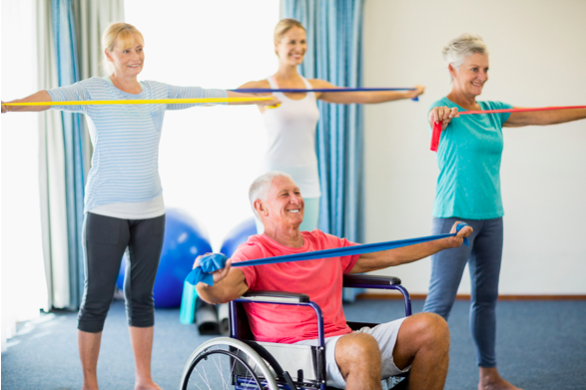Physiotherapist-Recommended Fall Prevention Tips for Seniors

Physiotherapy is often thought about in terms of recovery after an injury or to deal with an ongoing chronic condition. Registered Physiotherapists can also assist with teaching patients and clients preventative techniques to help reduce the risk of injuries and to improve healthy functioning. Seniors can benefit from home evaluations that review their environment to spot any potential problem areas or lifestyle choices.
Many seniors spend much of their time in their home. Some individuals have limitations due to mobility, while others restrict their physical activity for fear of falling or other injuries. Regular, appropriate exercises suited to the individual and making the right dietary choices can help seniors maintain strength, balance, flexibility, and more, all of which can help prevent injury and lower the risk of certain conditions and diseases.
Assistance from a physiotherapist can be a part of home health care services for you or your loved ones. A Registered Physiotherapist will review one’s medical history, lifestyle, activities, and environment to ascertain what changes can be made, plus look at the physical condition with tests to measure flexibility, balance, and strength. The following contains information about some key areas that seniors should consider improving for their physical health and to increase preventative lifestyle choices.
Falls &Slips
Many seniors, those aged 65 and older, fall each year and experience injuries like sprains, fractures, and other physical trauma. These injuries can lead to permanent damage and limit mobility, functioning, and can reduce one’s independence. Most of these falls are preventable and are due to hazards in the home or other physical impairments.
Reduce the likelihood of falls with these physiotherapist-recommended tips:
- Install appropriate lighting everywhere in the home and never walk through darkened rooms
- Be aware of the location of pets as to not trip or stumble over them
- Wear supportive footwear with orthotics and avoid slip-on style footwear
- Sit as much as possible while dressing and lacing up shoes
- Use devices for mobility assistance and have bars and grips installed around the home
- Regularly have vision checked and wear appropriate eyewear; remove reading glasses before walking anywhere
- Don’t try to balance on improper surfaces or climb up anywhere unnecessarily
- Ask for assistance to reach things and keep everything stored at reachable heights
- Handle icy surfaces by sprinkling salt or cat litter on slippery areas, and use a spiked cane for walking in wintry weather
- Make sure to always take medications properly and a medical practitioner of any side effects experienced
Regular Physical Activity
While some research suggests that stretching prior to engaging in physical activity, like sports, does not necessarily reduce incidences of injury, one’s overall physical activity levels, including stretching and yoga to increase flexibility, can help seniors and people of all ages stay healthy and avoid injuries, along with maintaining strength, balance, and endurance.
A physiotherapist can assist with customized exercise routines to suit the individual based on their current activity levels and capabilities. These may include walking, swimming, chair yoga, Tai Chi, and free weights.
Diet
Dietary choices are a part of physiotherapy that might not immediately come to mind, but one’s eating choices directly impact their health and functioning. Healthy athletes support their bodies with complete nutrition as a way of preventing injury on the field; the same goes for any individual living their daily life. Also, never forgot how important it is to drink water! People who consume the right nutrients each day can also recover from injury or manage chronic illnesses more easily.
It is important to stay hydrated throughout the day and eat plenty of whole, plant-based foods, and healthy fats to get all the vitamins, minerals, antioxidants, and anti-inflammatory components needed. Support bone health specifically with calcium, magnesium, vitamin D, and zinc together for proper absorption, plus omega-3s to fight inflammation and support tissues and joints. Consume leafy greens, seeds and nuts, wild seafood, eggs, whole grains, and low-fat dairy, too.
